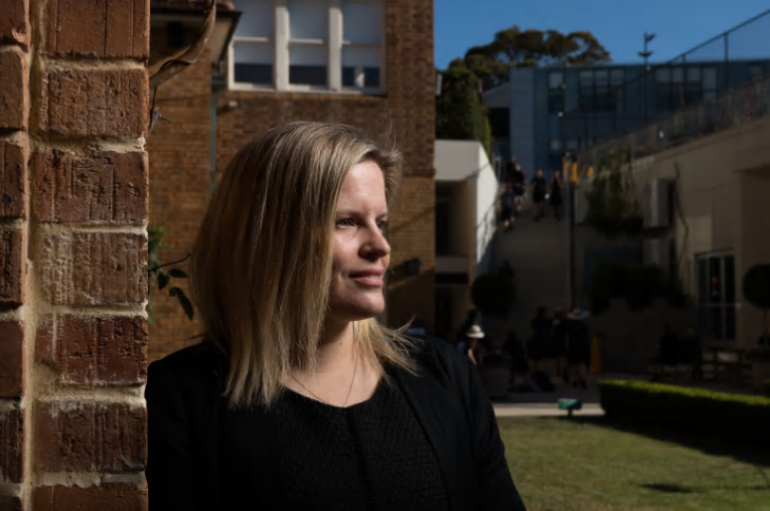CAITLIN FITZSIMMONS for the Sydney Morning Herald
Every school needs a Daisy Turnbull Brown. That's the view of the Productivity Commission, which has recommended every school appoint a designated wellbeing leader.
Ms Turnbull Brown is the director of wellbeing at St Catherine's, an Anglican girls' school in Waverley. She welcomes the focus on wellbeing and "positive psychology" - sometimes described as the science of human flourishing.
Daisy Turnbull Brown is director of wellbeing (formerly director of positive psychology) at St Catherine's School in Waverly. PHOTO: JANIE BARRETT.
"Some people look at it and they think that it is a private school thing but it's not," she said. "A lot of the schools that are practising it in different ways are state schools or systemic [Catholic] schools and they're really benefiting from the programs."
One in seven students will develop mental health issues and the Productivity Commission says schools can play a role in both prevention and early detection. It recommended schools employ a wellbeing leader who coordinates social and emotional learning programs for students, oversees professional development for staff, and is the first point of contact for teachers concerned about students' mental health.
Ms Turnbull Brown's program for students is taught during home-room lessons, covering topics such as character strengths, growth mindset, healthy relationships and goal setting. "It's about giving students a toolkit for resilience" that hopefully helps prevent mental ill-health, she said.
Ms Turnbull Brown was bullied in primary school before switching schools to Kincoppal in Rose Bay at the end of year 4. She is reluctant to go into details because she is keen to delineate when she is speaking in her professional capacity rather than as the daughter of Malcolm and Lucy Turnbull, but she acknowledges the experience was formative. "It inspired me to go into teaching and also to work as as a Lifeline counsellor."
Now 34, she has observed an increase in awareness of mental health among young people since her school days, with students using the language of positive psychology and "believing it".
"They might roll their eyes at certain times and to a degree, that's the right of every teenager, but our alumni survey shows they benefit from it," she said. "There's a generational element to it because I started learning about it before I became a parent and it’s affected my parenting and children who are learning about it at school will be more equipped when they're at university and when they’re parents."
Ms Turnbull Brown said the biggest challenge facing teenagers is the increased levels of depression and anxiety, which research suggests is correlated with social media use.
"Social media and online use has definitely changed the teenage years, especially for girls," she said. "There are increased rates of FOMO [fear of missing out] and experiences that can cause social anxiety in students. But there are benefits to social media because the girls are connecting there, their friendships are made on it, so I don't think it's necessarily the right thing to just say that social media is evil."
Ms Turnbull Brown said technology brings "immediacy" to teenagers' lives because information spreads so quickly. For people who take time to process their emotions, it can feel like everyone else has moved on without them.
NSW Education Minister Sarah Mitchell said the government would spend $88 million over the next four years to support the wellbeing and mental health of students in government schools. This included providing all government high schools with two full-time on-site mental health professionals.
"Many NSW public schools have wellbeing positions and every school has access to a team of staff from School Services from the Department of Education who have expertise in learning and wellbeing," Ms Mitchell said. "These staff work with our school counselling staff to support students."
Adrian Piccoli, a former education minister who now runs the Gonski Institute at the University of NSW, said the Productivity Commission approach was too prescriptive.
"If the school has already got a full-time school counsellor, then I'm not sure requiring the school to have another wellbeing person in senior management is necessarily going to be a good way of spending $130,000," Professor Piccoli said.
"Schools are increasingly taking wellbeing very seriously and I think you've got to give them the flexibility to deal with it the way they see best rather than mandating certain positions."
He said regional schools would find it difficult to recruit qualified wellbeing leaders, just as they find it hard to hire psychologists and counsellors.
